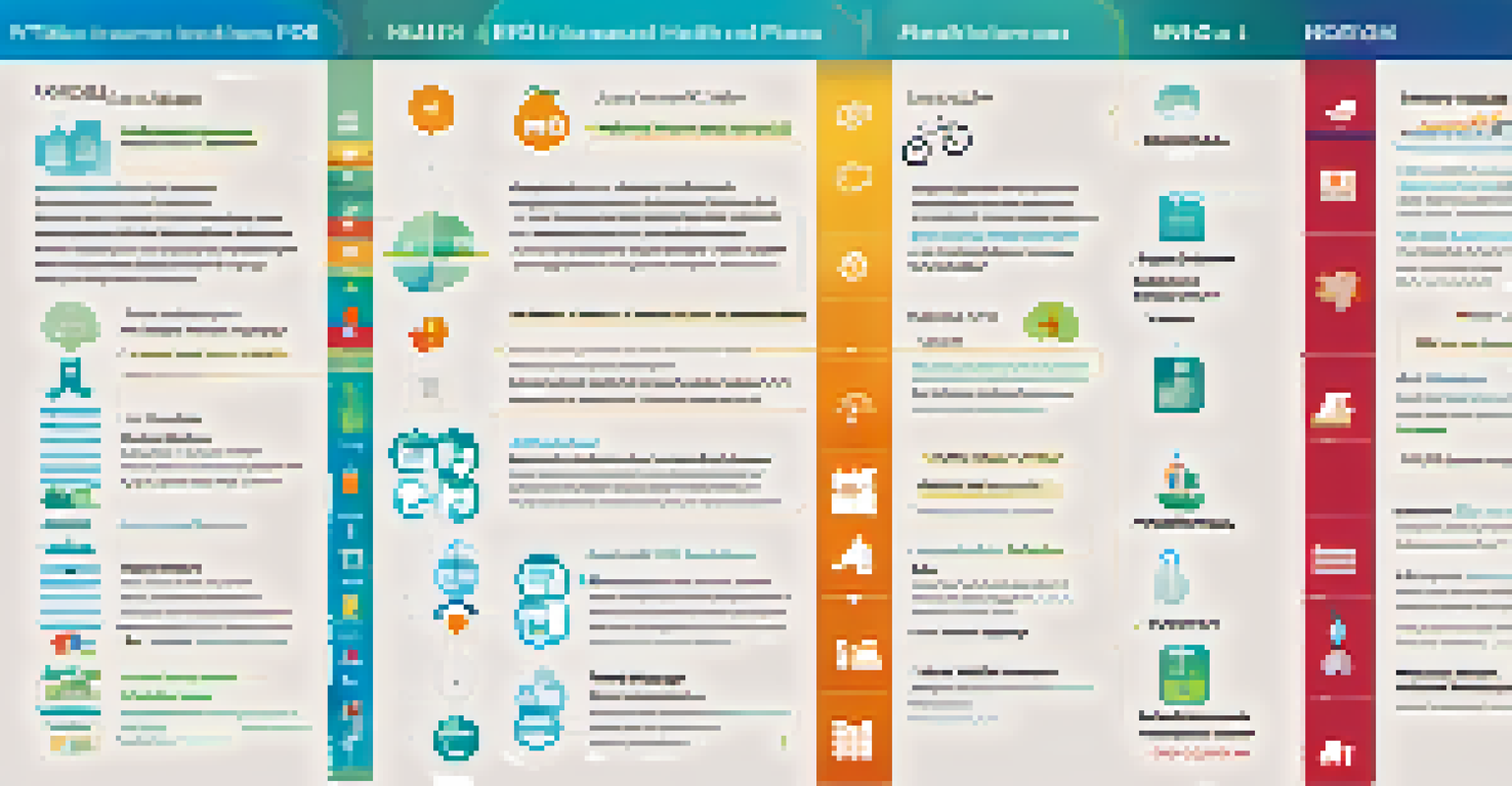Health Insurance Basics for Professionals: What to Know

Understanding the Importance of Health Insurance
Health insurance is more than just a safety net; it's a crucial part of managing your health and finances. For professionals, having the right coverage ensures that you can access necessary medical services without incurring crippling debt. Think of it as a protective shield that keeps you secure against unexpected health challenges.
Health insurance is not just about health; it’s about having a safety net for your financial future.
In today’s fast-paced work environment, many professionals overlook health insurance until they face a medical issue. This approach can lead to significant financial stress and can even affect your career. A sound health insurance plan provides peace of mind, allowing you to focus on your professional goals without worry.
Moreover, in many regions, having health insurance is not just a smart decision; it's a legal requirement. Understanding this importance and the implications of being uninsured can help you appreciate the role that health insurance plays in your life and career.
Types of Health Insurance Plans Explained
Navigating the world of health insurance can be overwhelming, especially with the variety of plans available. Common types include Health Maintenance Organizations (HMOs), Preferred Provider Organizations (PPOs), and Exclusive Provider Organizations (EPOs). Each of these has distinct features, like cost structures and provider networks, that can significantly impact your healthcare experience.

For instance, HMOs typically require you to choose a primary care physician and get referrals for specialists. This can lead to lower premiums but may limit your choices. On the other hand, PPOs offer more flexibility in choosing healthcare providers, though they generally come with higher costs.
Health Insurance is Essential
Having the right health insurance is crucial for managing both your health and finances, providing peace of mind against unexpected medical expenses.
Understanding these differences is crucial when selecting a plan that matches your health needs and lifestyle. It’s like choosing between a fast lane and a scenic route; both get you to your destination, but the journey and experience can vary widely.
Key Terms You Should Know
When delving into health insurance, you’ll encounter terms like premiums, deductibles, copayments, and out-of-pocket maximums. A premium is the monthly fee you pay for your health insurance, while a deductible is the amount you need to spend before your insurance kicks in. Understanding these terms is essential for making informed decisions about your coverage.
Insurance is like a parachute. If you don’t have it when you need it, it’s too late.
For example, if your plan has a high deductible, you may pay more upfront for services, but your premium might be lower. Conversely, lower deductibles often mean higher premiums. This trade-off is something every professional should consider when evaluating plans.
Additionally, knowing about copayments—fixed amounts you pay for specific services—can help you budget your medical expenses better. It's like having a menu where you know the price before ordering, ensuring you don’t get surprised by unexpected costs.
Evaluating Your Healthcare Needs
Before choosing a health insurance plan, take time to assess your healthcare needs. Consider factors such as any ongoing medical conditions, prescription medications, and the frequency of doctor visits. This self-assessment is akin to creating a road map for your healthcare journey.
If you require regular treatments or specialist visits, a plan with a lower deductible might be more beneficial, even if the premium is higher. On the other hand, if you’re generally healthy, a high-deductible plan could save you money over time. Think about your health history and any potential future needs as you make this choice.
Know Your Coverage Options
Understanding the different types of health insurance plans, such as HMOs and PPOs, helps you choose the best fit for your healthcare needs.
Ultimately, your health insurance plan should align with your personal circumstances. It’s about finding the right fit, just like choosing the perfect pair of shoes for a long day at work.
The Role of Employer-Sponsored Insurance
Many professionals receive health insurance through their employers, which can significantly influence their choices. Employer-sponsored plans often come with benefits like lower premiums and a larger selection of plans. This can be an excellent opportunity to access quality coverage without breaking the bank.
However, it’s essential to understand the specifics of your employer's offerings. Some employers may only cover a portion of the premium, while others might have comprehensive benefits that include dental and vision care. Being well-informed can help you maximize the advantages of your employer-sponsored plan.
Additionally, if you change jobs, you’ll need to consider how this impacts your healthcare coverage. It’s like switching teams; you want to ensure that your new environment supports your health needs just as well as your previous one.
Navigating Marketplace Options
For those who are self-employed or whose employers don’t provide coverage, health insurance marketplaces offer a viable alternative. These platforms allow you to compare various plans and find one that suits your budget and healthcare needs. It’s like shopping for a car; you want to compare models to find the best fit for your lifestyle.
Marketplace plans are categorized into different tiers—bronze, silver, gold, and platinum—each reflecting the level of coverage and cost-sharing. Bronze plans typically have lower premiums but higher out-of-pocket costs, while platinum plans offer the opposite. Understanding these tiers can help you assess which plan aligns best with your financial situation.
Beware of Common Myths
Dispelling myths about health insurance can empower professionals to make informed decisions about their coverage and access to care.
Moreover, many marketplaces provide subsidies for eligible individuals, making insurance more affordable. This is an important aspect to consider, as it can significantly reduce your overall healthcare expenses.
Common Myths About Health Insurance
As with many topics, health insurance is surrounded by myths that can mislead professionals. One common misconception is that you only need health insurance if you have health issues. In reality, insurance is about prevention and access to care when you need it most; it’s better to have it and not need it than to need it and not have it.
Another myth is that all health insurance plans are essentially the same. Each plan has unique features, costs, and networks, making it vital to do your research. Just as you wouldn’t buy the first car you see, don’t settle for the first insurance plan without exploring your options.

Dispelling these myths can empower you to make well-informed decisions about your health coverage. Think of it as equipping yourself with the right tools for a successful journey in managing your health.